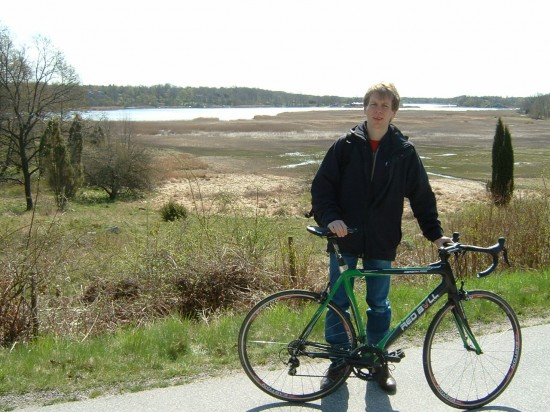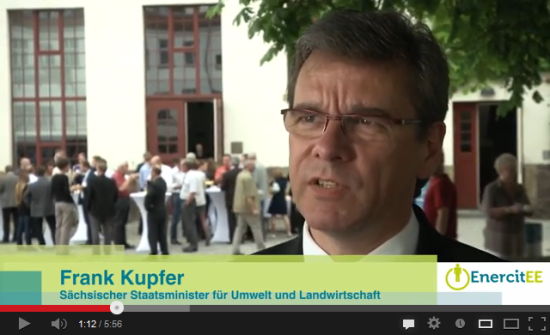Kurzfilm über EnercitEE in Sachsen
Im Rahmen der regionalen Abschlussveranstaltung am 13.06.2013 in Dresden Hellerau gedreht, fasst der Kurzfilm Ziele, Aktivitäten und Ergebnisse von EnercitEE in Sachsen zusammen:
Interview with Jakob Weber – PraTLA student at Energy Agency for Southeast Sweden
Interview: Lena Eckerberg

Hej Jakob! How did you find out about the PraTLA-Project?
To be honest, I´ve found out about PraTLA by incident. While I was looking for potential companies for an internship, I asked the Erasmus coordinator at my home University in Dresden (Saxony/ Germany) for a list of companies working in the field of environmental economics. Thus, I´ve got in touch with the Energy Agency for Southeast Sweden. After sending my application, the staff manager mentioned the PraTLA program.
EnercitEE poster series revised: New posters inform now about EnercitEE and all 11 sub-projects
After 2 years of EnercitEE the poster series of the project underwent a comprehensive revision. After running successfully two open calls for proposals EnercitEE is now financially supporting eleven sub-projects. Through the exchange of experience and joint as well as regional activities the sub-projects will improve local and regional Energy Efficiency policies for citizens and local authorities. Now several posters show the important role of the sub-projects within EnercitEE and present their aims, contents and planned outcomes.
GRACE – Analysis of funding programmes for citizens and communities
In Germany and especially in Saxony there are many funding programmes which support the energy efficiency of citizens and communities. Within the EnercitEE sub-project GRACE three funding programmes will be analysed in detail. The aim is to find out the effect of the programmes in that way that we are able to make a statement how many CO2 emissions respectively energy is saved with 1 € out of the funding programme.
One of the selected programmes is the Saxon Passive house programme. It is part of the Saxon Energy and Climate Protection Programme. The Passive house programme supports builders of passive houses with a grant of 100 €/m² based on the energy reference area. For refurbishment of buildings with passive house components the beneficiaries get a grant of 130 €/m² energy reference area. Both grants are non repayable. In Saxony the Passive house programme was used by 136 beneficiaries since 2007. In comparison with the standard EnEV building the passive house saves much more energy. The EnEV house is a standard in Germany. All builders of new houses have to follow this regulation. An amendment of this standard is planned for 2012, which means stricter rules for future homeowners. In the diagram below, there is a comparison between an EnEV house of 2009 and a passive house with 150 m² each. In addition it is assumed that the rate of energy price increase has a level of 5 % per year. All in all the beneficiary saves more than 20,000 € until year 30 after building and nearly 90,000 € until year 50 after building the passive house in that scenario.

2. Workshop „Contracting – Best practice examples” was very successful
On 21 May 2012 the second contracting workshop was carried out in Dresden entitled “Energy Saving Performance Contracting (EPC) in practice” within the sub project FIPREC. A total of 32 participants from Saxon municipalities and companies got to know three implemented EPC-Projects and learned how to implement their own challenging contracting projects and how they can address those.
The participants were shown practical opportunities to reduce the long-term energy costs and how they can resolve the refurbishment backlogs (e.g. technical equipment), without the use of financial resources through various energy-saving-performance-contracting options. Speakers presented three successfully implemented contracting projects and explained in detail the achieved savings as well as the efficiency improvements of these applied measures. In Saxony, the model project “Implementation of an energy savings performance contracting at the Theatres of Chemnitz” is currently being implemented.
The exchange of students’ experiences between regions is the central focus of PraTLA’s final stage
PraTLA is a sub-project on practical training of students and local energy experts in local authorities. It helps to open doors: students get a first insight into local administrational structures and local authorities learn to better tap certain potential and setting up of strategies using students as energy experts for these tasks.
The Sub-Project will end at 31st October 2012. Since the beginning of 2011 until now, approximately 58 trainings in 4 different countries have been carried out or are currently completing in municipal institutions.
For Lower Silesia, this time period was the core activity part of the project since all practical trainings were carried out in a period of three months. In this region there are only very few local energy strategies available. So, the students focused on helping the local authorities to set up an initial strategy on energy efficiency measures identifying some key areas. Seven papers on local strategies have been prepared under PraTLA in the region. In Haute-Savoie, smaller groups of students have assessed local EE activities in some smaller municipalities in the region and identified first improvement potential in this area which will be in some cases anchored in concrete measures that are being set up. In Saxony, students assessed concrete areas of intervention in local authorities or public institutions and performed feasibility studies on the improvement of heating systems or energy-efficient potential in the refurbishment of public buildings.
Students are helping Trixi for saving
Grandaunts are looking for possibilities for saving energy for Großschönau bath. Also other municipalities put on such helping.
Yvonne Geldner and Alexander Rewerk are studying industrial engineering with the specialization of energy management and energy technology at the University of Applied Sciences Zittau/ Görlitz. Currently, they are writing their diploma thesis and are working on a topic for “Trixipark Großschönau GmbH” (a holyday park with an adventure pool). Already in their semester before they did work on a topic for this municipal institution.
Extract of the press release: in “Sächsische Zeitung” (Newspaper from Saxony); April 2012
Instead of cooking coffee, Anton Zimmermann is helping the municipality of Kodersdorf to save money (and energy)
Anton Zimmermann is studying energy- and environmental technologies at the University of Applied Sciences Zittau/ Görlitz and completes their 5-month practical training at the municipality of Kodersdorf.
Extract of the press release: in Sächsische Zeitung (Newspaper from Saxony); 6th March 2012
Energy efficient Saxony: Ten new initiatives for climate protection
Under this slogan an EnercitEE conference took place on 27 February 2012 in Dresden.
The Saxon State Ministry for the Environment and Agriculture (SMUL), being the Lead Partner of EnercitEE, invited representatives of local authorities, energy agencies, universities and other interested parties to join the conference in order to not only getting to know new initiatives that deal with energy efficiency and climate protection but also to profit from their activities and results.
Mr Frank Kupfer opened the conference








